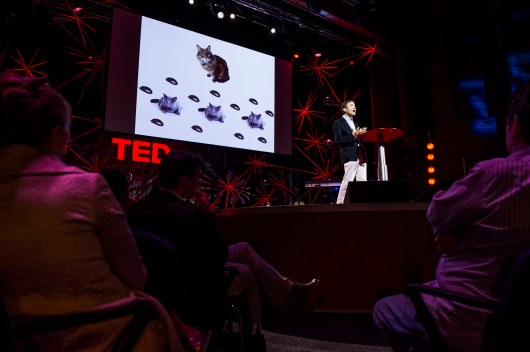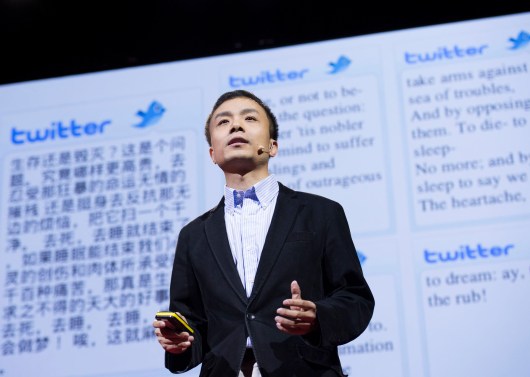A sick brick
“I want to make my friends understand: China is too complicated,” begins Michael Anti. “You can’t tell a one-size story.” According to some, China is a brick, helping the world economy. According to others, it’s a sick country, with no access to Facebook. (The second phrase was as claimed in the Facebook IPO papers.)
“If you’re a fan of Game of Thrones, you know how important a wall is for an old kingdom. It prevents the weird things from the north,” says Anti. China also had a wall to prevent invaders. But now, he says, it has a great firewall, the biggest in the world. That wall works to separate China from the world, and also separates Chinese internally, into sections.
In the past 15 years, Anti says, there have been non-stop cat and mouse games between authorities and the netizens. There are 500 million internet users in China. Even if it were totally isolated from the world, the internet there is still booming. He shows how there are versions of every service Westerners are familiar with: Google, Twitter, Facebook, and YouTube are all replaced by equivalents. The government blocks all the international services, and clones spring up inside. The policy is simple: clone and block. This fulfills two needs: to satisfy people’s need for social media, but also the need to keep the server in Beijing.
Some leaders, says Anti, haven’t understood this. Mubarak shut down the internet, so people had no choice but to go to the street. In Tunisia, the government allowed Facebook, and didn’t keep control of the servers.
Booming even with censorship
But the firewall and control of the servers doesn’t mean that social media isn’t powerful within China. In July 2011, there was a train wreck in the city of Wenzhou. Immediately afterward, authorities tried to keep quiet, “to literally bury the train.” In response, there were 10 million criticisms on social media platforms. The minister was fired and jailed.
One of the reasons that Chinese tweets have so much power, says Anti, is that they have three times the information volume as English tweets — 140 characters is a paragraph in Chinese. Furthermore, Weibo, the Twitter equivalent, is actually more like Facebook than Twitter, allowing comments and other ways of interacting. With 300 million users, it’s the biggest media platform in China. According to Anti, “It has become the media platform. Anything not mentioned in Weibo does not appear to have occurred for the Chinese public.”
Anti says that this is enabling the people to have strong voices, because they are able to tweet their stories. Call it “a Weibo petition.” Some stories are picked up and re-tweeted by popular online personalities — reporters, lawyers, actors — while others put pressure on local government. It’s becoming a real public sphere.
But there is a flip side. Weibo has a sophisticated censorship system. You can’t post the name of the president of the country, or even search for the surname of the top leaders. If you mention words like “get together” or “meet up” in a post, it might be automatically data-mined, recorded or sent to a pool for analyzing. So why is it sometimes successful?
A complicated picture
Something important is happening in the cat and mouse game, says Anti. There is the big cat — the central government — but also local cats, the local government. The central government tries very hard to control the local governments, which have no access to the data. Again, the servers are all in Beijing.
The most interesting question about the train crash is not why there were 10 million critical posts, but why in the first five days the central government allowed a window of free speech. Simple, says Anti, it was “because even the top leaders were fed up with this guy. They wanted an excuse to punish him. This kind of freedom is targeted.”
Social media has become a political tool of the governing party. This is new technology, but is culturally an update of the cultural revolution, which destroyed every local government.
We are the mouse, says Anti, and the mouse should always fight with the cats. And this fight isn’t restricted to China. In the West there were attempts to restrict internet freedoms, cats with names like SOPA and PIPA. Anti reminds us that “Facebook and Google claim they are friends of the mouse, but sometimes we see they are dating the cats.”
Photos: James Duncan Davidson


Comments (7)
Pingback: What is Happening to Weibo? - Tea Leaf Nation
Pingback: How China’s “Reincarnation Party” Takes Aim at Online Censors « NamViet News
Pingback: Weekly Round Up July 18 – 2012 | Connect the Dots
Pingback: 安替:新闻已死 | 阿森·天下
Pingback: Today's China Readings July 6, 2012 | Sinocism
Pingback: Pseudo Random News and Comment | Mortality Sucks
Pingback: Today’s China Readings July 5, 2012 | Sinocism